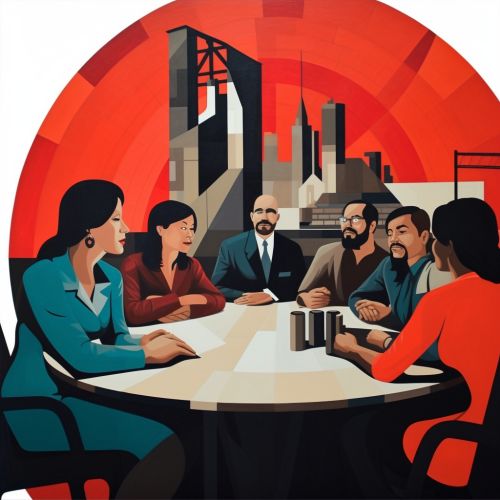Socialism
Definition and Origins
Socialism is a socio-economic and political ideology that advocates for the means of production, distribution, and exchange to be owned or regulated by the community as a whole. It is a broad concept with many variations, including democratic socialism, revolutionary socialism, and market socialism, among others. The term "socialism" was first used in the early 19th century in Western Europe, during the Industrial Revolution. It was a response to the social and economic disparities caused by capitalism, where wealth and power were concentrated in the hands of a small group of industrialists and landowners.
Theoretical Foundations
The theoretical foundations of socialism are rooted in the works of various philosophers, economists, and political theorists. Among the most influential are Karl Marx and Friedrich Engels, who argued in The Communist Manifesto that capitalism would inevitably lead to social inequality and class struggle. They proposed socialism as a transitional stage towards a classless, stateless society known as communism. Other key figures include Robert Owen, who established cooperative communities as a model for socialist living, and Pierre-Joseph Proudhon, who advocated for mutualism, a form of socialism that maintains respect for individual property rights.
Economic Principles
The economic principles of socialism revolve around the collective ownership of the means of production. This can take the form of public ownership, cooperative ownership, or common ownership. In a socialist economy, production is carried out to directly satisfy economic demand and human needs, and the surplus value goes to the society at large, rather than private capitalists. This is in contrast to a capitalist economy, where the means of production are owned by private individuals or corporations, and production is guided by the pursuit of profit.
Political Implementation
The political implementation of socialism can vary greatly, from democratic and parliamentary systems to revolutionary and authoritarian regimes. Democratic socialism advocates for the implementation of socialist principles within a democratic framework, while revolutionary socialism supports the overthrow of the existing social order to establish a socialist society. In the 20th century, a number of countries, including the Soviet Union, China, and Cuba, implemented forms of socialism, often accompanied by centralized planning and state control.


Criticisms and Controversies
Socialism has been subject to various criticisms and controversies. Critics argue that socialism can lead to inefficiencies and economic stagnation due to the lack of a profit motive and competition. They also express concerns about the potential for state power to be concentrated in the hands of a few, leading to authoritarianism and the suppression of individual freedoms. Supporters of socialism counter these criticisms by pointing to the social inequalities and economic instabilities inherent in capitalism, and argue that socialism can provide a more equitable and sustainable alternative.
Socialism in the 21st Century
In the 21st century, interest in socialism has seen a resurgence, particularly in response to growing income inequality and the perceived failures of neoliberal capitalism. This has led to the rise of new socialist movements and parties in various countries, advocating for policies such as wealth redistribution, public ownership of key industries, and stronger labor rights. However, the practical implementation of these policies and the definition of what constitutes "socialism" in the contemporary context remain subjects of ongoing debate.
